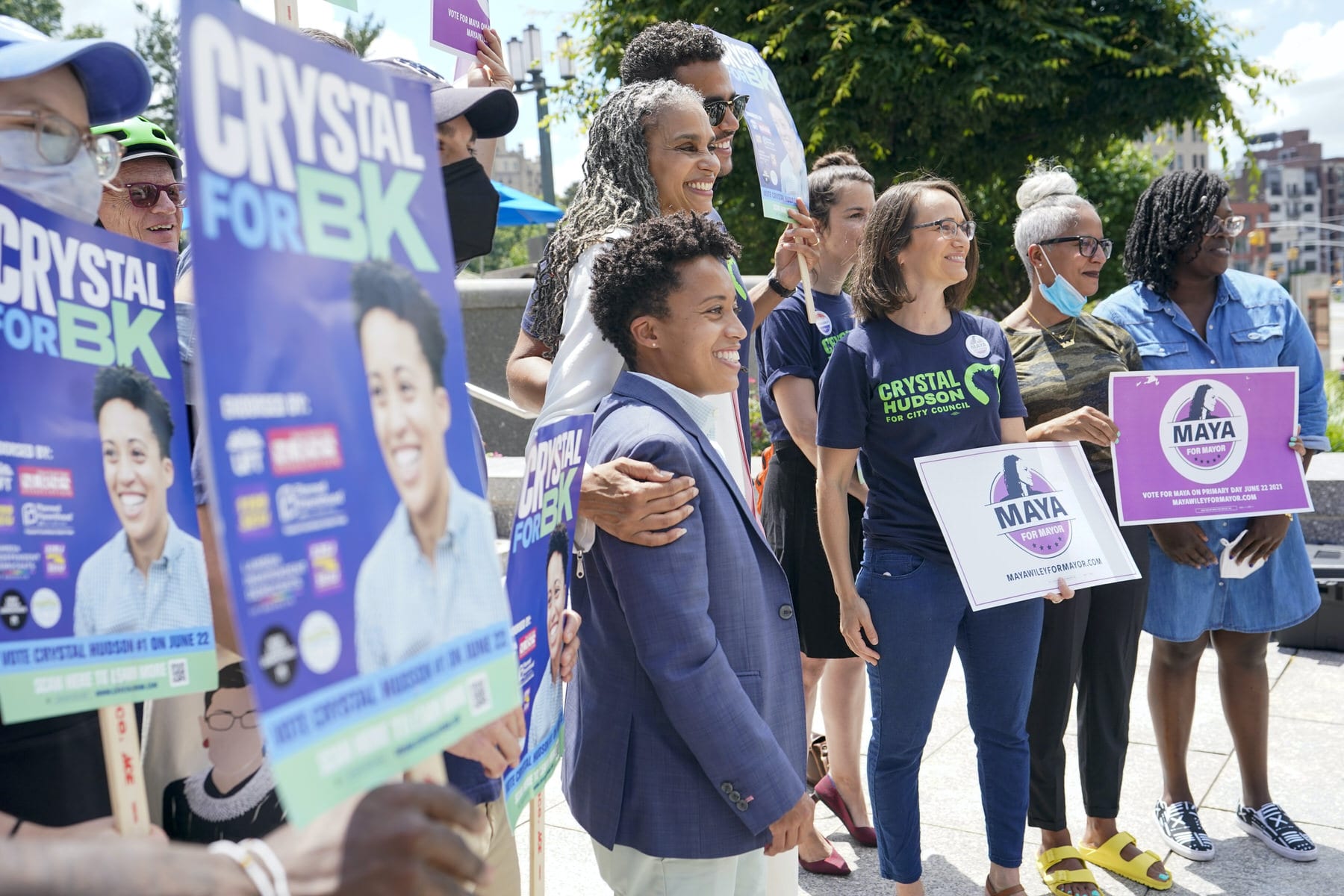Women are expected to have record representation on the New York City council, one of the most powerful bodies of local government in the country, and some organizers and candidates partially credit the city’s new use of ranked-choice voting for the milestone.
Election results following the city’s June 22 primary, which have not been finalized, show at least 30 women candidates are leading in their races for city council. The bulk of the winning primary candidates are Democrats, a party that dominates in voter registration in New York City, so it’s widely expected that many of the Democratic primary winners will go on to win in the general election.
The end result will likely be historic representation for women, women of color and LGBTQ+ people on the 51-member council. Women could end up filling more than half of the seats, a massive jump from the 14 who currently serve on the council. (There was a previous high of 18 women on the council back in 2009.) Organizers estimate that 86 percent of the women candidates who are leading in their primaries are women of color. Separately, organizers estimate there could be at least six out LGBTQ+ council members, surpassing the record of five.
“Ranked-choice voting has literally transformed the political landscape of New York City and has resulted in much needed increased representation of women, new Americans, first-time candidates and those who are not connected to party machines,” said Rose Pierre-Louis, executive board member of Rank the Vote NYC, which advocated for the ranked-choice voting system New York City voters approved in 2019. “I think that is a tremendous result.”
Ranked-choice voting effectively allows voters to pick multiple candidates in a race, with a process of elimination for least preferred candidates if no one gets a majority of votes. Many current members of the council were leaving because of term limits, which some organizers and candidates believe was a key factor in the expected surge of women city council members because it gave more non-incumbents the opportunity to run and win. Experts say that, coupled with ranked-choice voting, gave candidates in some crowded races more room to campaign without worrying that they would split votes.
Research shows removing that dynamic through ranked-choice voting tends to elevate candidates who are women and people of color. They run and win in higher numbers in elections with ranked-choice voting.
In New York City, primary voters were able to pick up to five candidates for mayor, a race that received considerable national attention. Eric Adams, the Democratic primary winner for mayor, will become only the city’s second Black mayor if he is elected in November. He won his historic campaign after a close race with Kathryn Garcia, a former city sanitation commissioner, following eight rounds of elimination in a crowded primary. Garcia’s candidacy and the candidacy of Maya Wiley, a former city adviser who came in third, shows how ranked-choice voting raised the profiles of multiple women and people of color (Garcia is White; Wiley is Black).
Cynthia Richie Terrell, founder and director of RepresentWomen, said there is still incoming data on the complete breakdown of ranked-choice voting in New York City. But she said it’s clear there were overlapping votes between Garcia and Wiley. She said that has significance for women and people of color who seek future bids for mayor and other offices.
“It gets away from that idea that somehow there’s ‘a woman’s lane’ or ‘the Black candidate’s lane,’ but that, ‘Wow, multiple women can run and that’s fine, and they don’t split the vote,'” she said.
Several cities and jurisdictions have enacted ranked-choice voting, and many more are expected to incorporate it into their elections. But the New York City mayoral race in some ways put it on a bigger national stage. Organizers hope that headlines about botched results — the New York City Board of Elections erroneously at one point released incorrect preliminary results — will not be seen as a reflection of a system that has worked in other places.
State legislators have already indicated plans to review the election board, which has a history of problems.
Most primary candidate winners for city council led their races after the first round of election results. (One city council candidate, Kristin Richardson Jordan, was initially not in the lead in her race after the first round of results but has since surpassed the incumbent). But the ripple effect overall, according to experts, organizers and candidates, is a more level playing field for multiple candidates seeking the same office. In several instances, they were able to run more robust campaigns that were also more positive and collaborative as they vied to be voters’ second and third choices.
Jordan and Crystal Hudson, who won her primary for a council seat representing a part of Brooklyn, are expected to become the first out Black gay women to serve on the council. Hudson said she spent considerable time educating potential voters about ranked-choice voting while reaching out to a broad coalition of potential supporters. Hudson described herself as a non-traditional candidate who still faced forms of sexism and racism on the campaign trail. But she said ranked-choice voting helped remove barriers that often come into play for political newcomers in the primary.
“Ranked-choice voting gives people like me a real shot at actually winning,” she said. “And so, even when we may not be somebody’s first choice, for them to be able to put us as a second or third choice, I think is where we see a solid difference.”
There was also more organization among different political groups, including 21 in ‘21, a nonprofit group co-founded in 2017 by former women city council members. The organization has a goal of electing more women on the council and endorsed more than 74 women candidates in 37 districts.
Jessica Haller, the executive director of 21 in ‘21, listed several reasons that women were poised to have more political power: ranked-choice voting; the city’s matching funds, which help candidates finance their campaigns; and “the ecosystem of support that has grown up around supporting women,” including her group but also Eleanor’s Legacy and Vote Mama. She said all of it was part of a moment, where people sought tangible change in response to the pandemic and growing inequities.
Haller said women have lived experiences of being parents and caregivers, among other roles, that give them unique perspectives on addressing issues like education and health care. She hopes that will mean different policymaking.
“Women in leadership looks like a greater focus on the future, better focus on long-term planning and better focus on generational shifts,” she said.
Sandy Nurse, an Afro-Latina community organizer who also won her primary race for a city council seat representing a part of Brooklyn, said women candidates are not monolithic in terms of their priorities once they’re elected to office. But she is hopeful many will put more attention on issues like a lack of accessible child care, affordable housing and reproductive health — all issues that she believes the pandemic exacerbated.
“I think that having a dominant amount of women in the city council is going to mean that we’ll see a serious focus on those issues and improvements in the lives of women and families,” she said.
Richie Terrell noted the ways that history intertwines with the present. When New York City implemented a form of ranked-choice voting in the 1930s, it soon afterward elected its first woman to the council.
“If that’s not a compelling story to tell about the impact of rules impacting representation outcomes, I don’t know what is,” she said.





